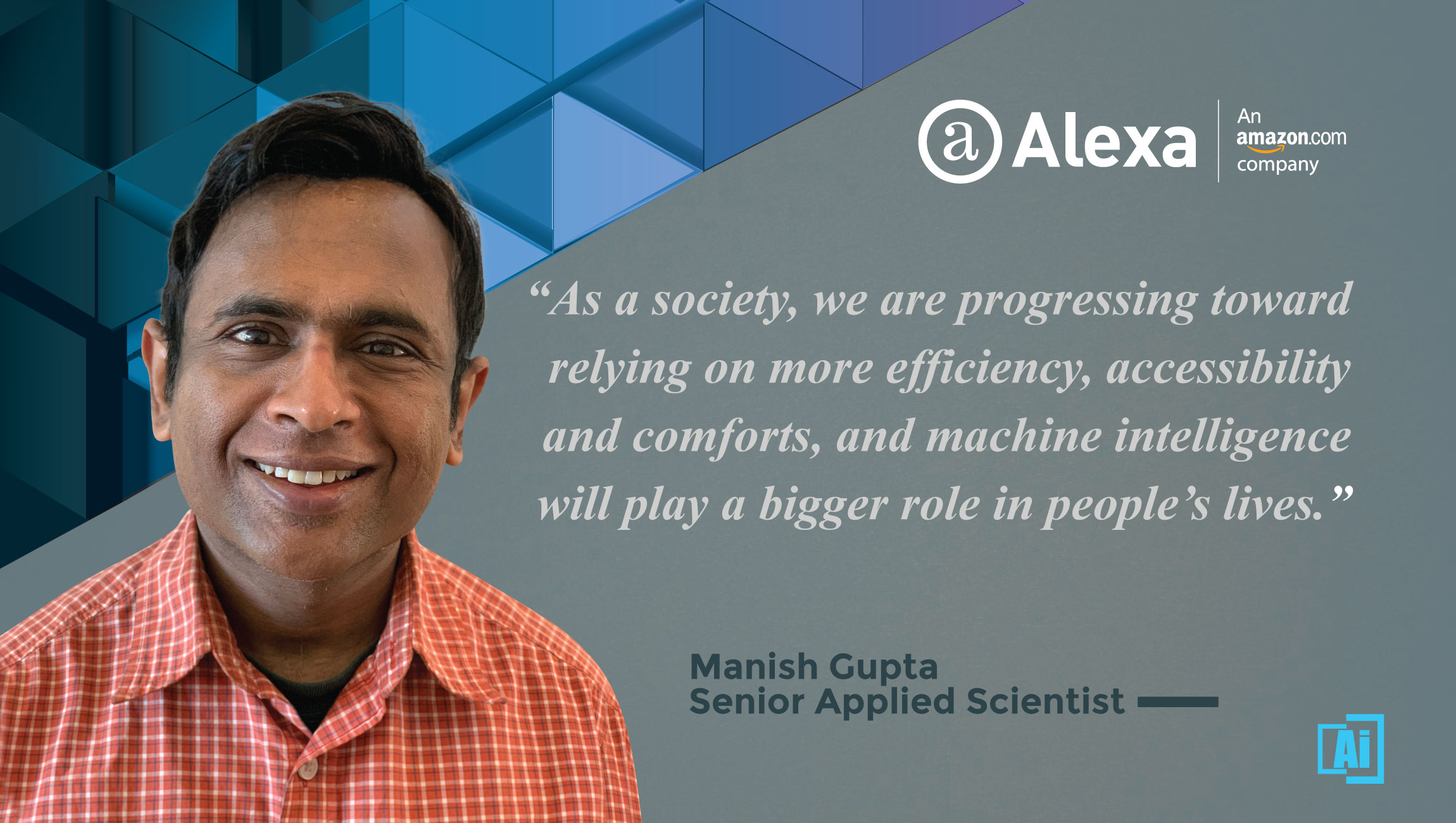AiThority Interview with Manish Gupta, Senior Applied Scientist at Alexa.com

Dr. Gupta, how are you working with technologies like AI, Machine Learning and Natural Language Processing at Alexa.com, an Amazon subsidiary that provides marketers with SEO and competitive intelligence tools?
We use Machine Learning to surface common audiences between different websites. This allows customers to analyze what their peer set is doing and what kind of content interests their audience. We are also developing tools using patented AI and NLP technologies to help marketers get a better idea of what content will perform well on social media.
How did your research and career in AI and Machine Learning begin?
As part of my doctoral and post-doctoral research in Mathematics, I developed and applied various ML and signal processing algorithms to solve problems in medicine. These techniques had wider applicability to Big Data-driven learning. Leveraging my prior experience as a Software Engineer, Data Science seemed like a natural career fit. Since then, I have worked in several industries developing and applying AI technologies.
What kind of background, specialization, and/or interests do you think are especially important for a career in Data Science?
A strong background in Mathematics and Statistics is imperative, in my opinion. Some programming experience is also helpful, but in my experience, the most successful Data Scientists have a solid quantitative understanding that allows them to customize ML algorithms for specific problems at hand.
Read More: AiThority Interview with Eric Vardon, CEO at Morphio
What spurred you to join Alexa.com?
I consider myself an applied mathematician, and I’m passionate about various applications of mathematics in the real world. When the opportunity at Alexa.com presented itself and I realized the useful nature of the data that Alexa.com has, I saw it as an opportunity to work on AI-powered tools that would really help our customers.
What tips do you have for professionals – and perhaps those in the MarTech industry in particular – who are just starting out with Data Science, AI, and NLP technologies?
My top advice is to really get to know the customer you’re serving. Sit in on or conduct interviews with the customers whose problems you’re trying to solve. It’s also a great idea to stay up to date on industry trends. If you’re in the MarTech industry, for example, subscribe to various martech outlets and read what your customers are reading.
In your view, which industries have been the fastest to successfully integrate NLP- and AI-fueled technology platforms into their businesses?
A few industries that have quickly progressed on the NLP and AI side of things are:
- Digital assistants (e.g. Siri and Alexa)
- Navigation tools (e.g. Google Maps)
- Retail industries, especially in the areas of Marketing and Sales
- Manufacturing industries, with regards to process Automation and Robotics
- Financial services, in particular, credit decisions, risk management, and automated trading
- Automotive and transportation (e.g. self-driving cars)
- Insurance/Health (e.g. processing of electronic health records)
Which other industries have a high ceiling for AI and NLP applications but still have a long road ahead?
A few industries that come to mind are:
- Legal industry (e.g. document preparation and information discovery)
- Medicine, especially in automated diagnostics, therapy, and treatment
- AI-based educational tools (e.g. a virtual cadaver for anatomy students)
Read More: AiThority Interview with Dr. Satya Ramaswamy, Executive Vice President at Mindtree
Internally, do Alexa.com’s Marketing, Sales and Customer Service teams benefit from your projects and research as well, or is your work primarily focused on enhancing Alexa.com’s customer-facing solutions?
Our work in the AI/NLP space is primarily focused on enhancing our customer-facing solutions. However, since our customers are primarily marketers, our internal marketers benefit from using our tools.
In your view, how potent is human-machine intelligence for businesses and society right now?
Right now, AI-powered applications are highly prevalent in both society and in businesses. Examples include social connectivity, navigation, personalized shopping or recommendations, personalized banking, smart homes, prediction of equipment failures, etc. More people are relying on such intelligence for their day to day activities, such as watching a movie on Netflix or navigating using Google maps. Businesses are cutting down costs by employing Chatbots or Voice Assistants for customer support and operations. As a society, we are progressing toward relying on more efficiency, accessibility, and comforts, and machine intelligence will play a bigger role in people’s lives.
Are there any sub-technologies or capabilities within the AI/NLP/Machine Learning ecosystem that you’re particularly excited to see mature?
I would like to see the area of natural language understanding mature, especially text comprehension and cross-lingual representations.
Lastly, what’s your smartest work-related shortcut or productivity hack?
Two come to mind:
- When I’m going to start a new task, I always check to see if someone else has done it first. Don’t reinvent the wheel!
- When I’m trying to develop something, I like to think of the bigger picture. What is the more general problem at hand? What you’re developing may be applicable to many things, even in your same domain space.
Read More: AiThority Interview with Massimiliano Versace, CEO and Co-Founder at Neurala
Thank you, Manish! That was fun and hope to see you back on AiThority soon.
Dr. Manish Gupta is a Senior Applied Scientist at Alexa.com, the marketing analytics subsidiary of Amazon. He has over 9 years of experience as a quantitative researcher in the fields of mathematical modeling and machine learning, and 3 years of experience as a data scientist in the fields of natural language processing (NLP) and topic modeling.
Manish received a Ph.D. from Harvard University in Applied Mathematics, and was a postdoctoral fellow at Harvard focusing on big data analytics in medicine. Since joining Alexa, he has focused on building AI-powered tools to help marketers understand and engage their audience, and has served as an instructor for Amazon’s Machine Learning University.
Alexa.com, a subsidiary of Amazon, is a trusted source of insights into digital behavior that marketers use to help win their audience and accelerate growth. Subscribers to the Alexa Marketing Stack leverage rich competitor and audience insights that help them better understand their audience, discover opportunities for growth across multiple marketing channels, and manage the day-to-day workflows of planning, creating, optimizing, promoting, and measuring the effectiveness of their content marketing.


Comments are closed, but trackbacks and pingbacks are open.